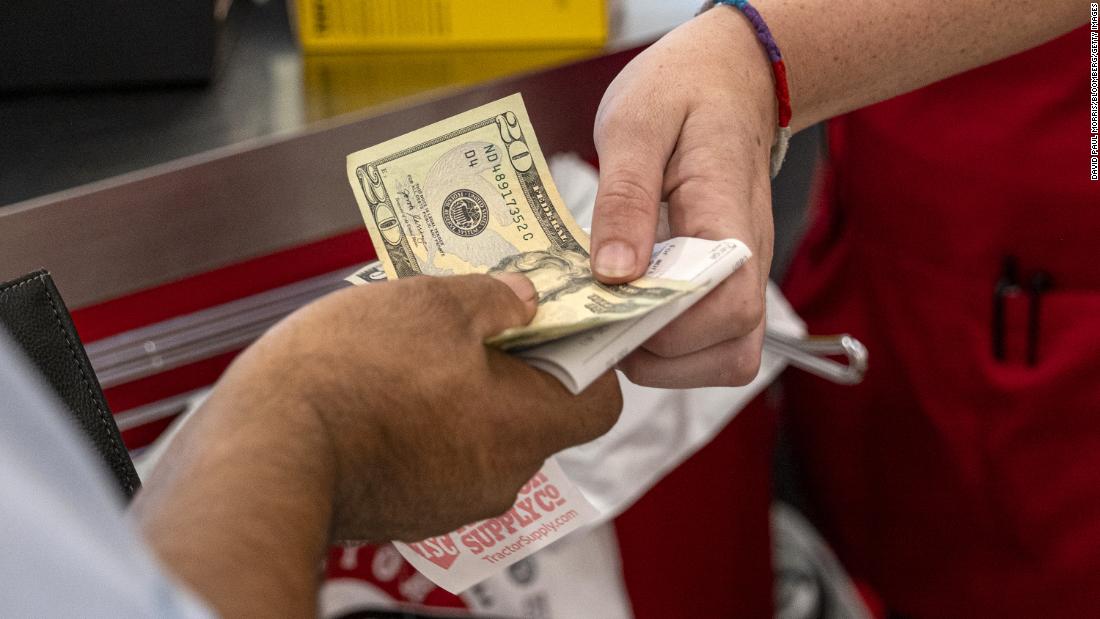In their roles as consumers, investors and members of the workforce, ordinary Americans have the sense that the country is at an economic inflection point, but without a clear picture of what happens next, nor how to prepare.
“If you’re not a little confused about the economy, you’re not paying attention,” Harvard economist and former White House economic adviser Jason Furman
tweeted last week.
Companies are hiring, but output is dropping. Consumers are pessimistic about what lies ahead, but they keep spending. The economy zigged when it was supposed to zag, and even the professionals are searching for answers.
On Twitter, Glassdoor senior economist
Daniel Zhao called the disconnect between the rising number of people newly filing for unemployment and the almost static number of ongoing claims “weird.”
Federal Reserve Governor Christopher Waller called the disparity between growing employment and shrinking output “odd,” and the divergence of income and output data “a puzzle”
in a recent webinar.Even Federal Reserve Chair Jerome Powell sounded somewhat baffled
in a central banker economic forum in Portugal last month. “I think we understand better how little we understand about inflation,” he said.
With all of this head-scratching by the experts, it’s no wonder ordinary Americans are feeling anxious, exhausted or dispirited — or all three.
“People have been put through the wringer these last two years,” said Mark Zandi, chief economist at Moody’s Analytics. “The sentiment is consistent with a very nervous consumer.”
The Conference Board’s Leading Economic Index reversed earlier gains and fell in the first half of 2022, signaling that near-term recession risks have grown,
the group said. University of Michigan data showed that
consumer sentiment tumbled to a record low between May and June, but — perhaps surprisingly — that hasn’t translated to a widespread pullback in spending. Retail sales rose in May, likely reflecting the increasing rate of inflation — and the continued ability of consumers to spend.
Although the personal savings rate has dropped significantly from its pandemic peak of 24.8% in May 2020, it remained at 5.4% two years later, and household balance sheets are still relatively strong.
“Sentiment has been a poor guide to spending recently; people with more than $2 trillion in aggregate excess savings might say they are miserable, but they can still go shopping,” Pantheon Macroeconomics chief economist Ian Shepherdson pointed out in a recent research note.
One trigger for our collective malaise could be a feeling of powerlessness, experts say.
“I think part of what’s going on is there are certain parts of consumers’ budgets they don’t have much control over,” said George Loewenstein, professor of economics and psychology at Carnegie Mellon University. “Everyone seems to feel like we’re on a knife edge.”
Zandi pointed to the price of gas as a particular flash point.
“You can’t overstate how debilitating $5 a gallon is,” he said. “Economists are always confused by how outsized a role gas prices play in people’s economic thinking. It’s because it’s in their face all day long.”
Even though Americans’ gas costs as a share of income are below where they have been at points in the past when adjusted for inflation, paying more stings with every fill-up. “It’s financially eviscerating,” Zandi said. “Nothing drives people crazier.”
Loewenstein also said that a “recency bias” is most likely at play.
“Generally, people are pretty short-sighted. We tend to think the future is going to be similar to the present,” he said. In other words, a recent past that includes blistering inflation, pain at the pump and higher borrowing costs can put a damper on enthusiasm, even if that pain turns out to be short-lived.
Part of the problem with generalizations is that, with a roughly $25 trillion gross domestic product and 330 million people, give or take, the “American economy” isn’t a monolith. And at a time of sharp political and cultural polarization, it is perhaps fitting that economic data seems to reflect both the best of times and the worst of times.
“I think people’s perceptions are clearly colored by the prism they’re looking through,” Zandi said. “The political environment is badly polarized, and that’s reflected in how people think about things.”
While this means that grad students in economics will likely be arguing about this period of time for decades to come, experts say there are real-world consequences to using politics as a lens for financial decision-making.
“In most times, sentiment reflects the economy. It doesn’t create it — except at turning points,” Zandi said.
“If people get pessimistic, we’ll go into a recession. If people maintain optimism, then the economy will probably have a soft landing — but it makes for a very unstable situation,” Loewenstein said. “The economy depends on expectations, and expectations depend on the economy.”


























